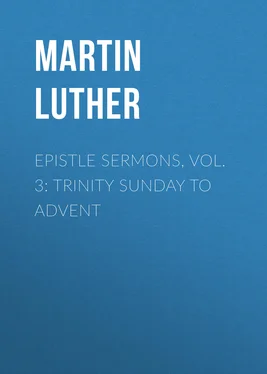Martin Luther - Epistle Sermons, Vol. 3 - Trinity Sunday to Advent
Здесь есть возможность читать онлайн «Martin Luther - Epistle Sermons, Vol. 3 - Trinity Sunday to Advent» — ознакомительный отрывок электронной книги совершенно бесплатно, а после прочтения отрывка купить полную версию. В некоторых случаях можно слушать аудио, скачать через торрент в формате fb2 и присутствует краткое содержание. Жанр: foreign_prose, foreign_religion, Философия, foreign_psychology, foreign_antique, на немецком языке. Описание произведения, (предисловие) а так же отзывы посетителей доступны на портале библиотеки ЛибКат.
- Название:Epistle Sermons, Vol. 3: Trinity Sunday to Advent
- Автор:
- Жанр:
- Год:неизвестен
- ISBN:нет данных
- Рейтинг книги:5 / 5. Голосов: 1
-
Избранное:Добавить в избранное
- Отзывы:
-
Ваша оценка:
- 100
- 1
- 2
- 3
- 4
- 5
Epistle Sermons, Vol. 3: Trinity Sunday to Advent: краткое содержание, описание и аннотация
Предлагаем к чтению аннотацию, описание, краткое содержание или предисловие (зависит от того, что написал сам автор книги «Epistle Sermons, Vol. 3: Trinity Sunday to Advent»). Если вы не нашли необходимую информацию о книге — напишите в комментариях, мы постараемся отыскать её.
Epistle Sermons, Vol. 3: Trinity Sunday to Advent — читать онлайн ознакомительный отрывок
Ниже представлен текст книги, разбитый по страницам. Система сохранения места последней прочитанной страницы, позволяет с удобством читать онлайн бесплатно книгу «Epistle Sermons, Vol. 3: Trinity Sunday to Advent», без необходимости каждый раз заново искать на чём Вы остановились. Поставьте закладку, и сможете в любой момент перейти на страницу, на которой закончили чтение.
Интервал:
Закладка:
21. Hereupon follows the text, which Saint Paul begins with emotions of profound astonishment at the judgment and dealings of God in his Church, saying:
"O the depth of the riches both of the wisdom and the knowledge of God! How unsearchable are his judgments, and his ways past tracing out!"
22. Sublime are the thoughts and counsel of God, transcending by far the mind and comprehension of man, yea of all creatures, when he so richly pours forth his goodness and out of pure grace and mercy elects, as beneficiaries of that goodness, the poor and wretched and unworthy, who are concluded under sin—that is, those who acknowledge themselves before God to be guilty and deserving of everlasting wrath and perdition; when he does all this that they might know him in his real divine essence, and the sentiment of his heart—that through his Son he will give all who believe everlasting life. And, again, that they might know how he will reject and condemn the others—those who, in pride and security, boast of their own gifts and the fact that they are called the people of God in preference to all other nations; who boast that they have special promises, that they have the prophets, the fathers, etc.; who think that God will acknowledge no nation on earth but themselves as his people and his Church. He will reject them on account of their unbelief, in which they are fettered by the pride and imaginations of their own wisdom and holiness.
23. This is that rich, inexpressible, divine wisdom and knowledge which they possess who believe in Christ, and by which they are enabled to look into the depths and see what the purposes and thoughts of the divine heart are. True, in their weakness they cannot fully reach it; they only can apprehend it in the revealed Word, by faith, as in a glass or image, as Saint Paul says. 1 Cor 13, 12. But to blind, unbelieving reason, divine wisdom will be foreign and hidden; nothing of it will enter reason's consciousness and thoughts, nor will reason desire more though a revelation be given.
24. That attitude Saint Paul encountered, especially when the arrogant Jews opposed themselves so sternly and stubbornly to the preaching of the Gospel. Filled with astonishment, he exclaimed: What shall I say more? I see indeed that it is but the deep unsearchable wisdom of God, his incomprehensible judgment, his inscrutable ways. So he says elsewhere: "But we speak God's wisdom in a mystery, even the wisdom that hath been hidden, which God foreordained before the world unto our glory: which none of the rulers of this world hath known." 1 Cor 2, 7-8.
25. This depth and richness of wisdom and knowledge, we Christians apprehend through faith; for, as Saint Paul says, it cannot be apprehended nor comprehended otherwise. Though the world will not do it, we will firmly believe that God is a true God and Lord, wise, just and gracious, whose riches and depth are ineffable. We will glorify him with our whole heart, therefore, as he ought justly to be praised and glorified by every creature, for his wonderful government of his Church, through his Word and revelation. Whosoever will hear and receive the same shall have light that will turn them to him and give them a knowledge of their salvation—an experience which others can never realize. And he is to be glorified because he manifests such unutterable goodness to all who are in sin and under God's wrath that he translates them, though they are unworthy and condemned, from the power of death and hell into the kingdom of eternal grace and life, if they will only seek grace and believe on Christ his Son. And, on the other hand, he is to be glorified because, as a just judge, he rightfully rejects and condemns those who will not believe the revelation and testimony of his will in his Son; who insist on, and boast of, their blind fancies, of their own wisdom and righteousness. Being accordingly deprived of such light, such grace and consolation, they must forever be separated and cast forth from the kingdom of God, regardless of what great name and fame may have been theirs when they were supposed to be the people and Church of God.
26. And such are God's unsearchable judgments and his ways past tracing out. Such are his government and works. For by "judgments" is meant that which in his view is right or wrong; what pleases or does not please him; what merits his praise or his censure; in short, what we should follow or avoid. Again, by "his ways" is meant that which he will manifest unto men and how he will deal with them. These things men cannot and would not discover by their own reason, nor search out by their own intellect, and never should they oppose their judgments or speculations to God. It is not for them to say what is right or wrong, whether an act or ruling is divine. They should humble themselves before him and acknowledge that they cannot understand, they cannot teach God in such matters; they should give him, as their God and Creator, the honor of better understanding himself and his purposes than do we poor, miserable worms.
"For who hath known the mind of the Lord? or who hath been his counselor? or who hath first given to him, and it shall be recompensed unto him again?"
27. Paul states three propositions which take away from the world all its boasting concerning divine things: To know the mind of the Lord—what are his thoughts and purposes, or what he has determined within himself from eternity; to be his counselor—advising or showing him what to do and how to do it; to give to him—assisting him, by one's own ability, to accomplish his divine purpose. All this is impossible to human nature; it cannot know his mind, and how much less will it be able, with all of its wisdom and activity, to counsel him or give him anything.
28. Therefore, it is a shameful presumption on the part of the world to presume by its own powers to ascertain and discover God's essence, his will and works, and to counsel him as to his duties and pleasures; and shameful is it that it presumes with its works to have merited something from him, and to have earned a recompense; shameful presumption to expect to be honored as having achieved much for God's kingdom and for the Church—strengthening and preserving them and filling heaven with holiness!
29. God must defeat minds so perverted. In his administration he must disregard their opinions and attempts. Thus, being made fools by their own wisdom, they may stumble and be offended at it. So would God, by showing us the realities, convince us of the futility of our own endeavors and lead us to acknowledge that we have not fathomed his mind, his counsel and will, and that we cannot counsel him. No man or angel has ever yet first thought out for God his counsel, or offered suggestion to him. Much less is he compelled to call us into counsel, or recompense us for anything we have given to him.
THREE CLASSES OF PEOPLE
30. There are three different kinds of people on earth, among whom Christians must live. The first of these are that rude class which is unconcerned about the nature of God and how he rules. They have no regard for God's Word. Their faith is only in their mammon and their own appetites. They think only of how they may live unto themselves, like swine in the sty. To such we need not preach anything of this text: "O the depth of the riches both of the wisdom and the knowledge of God." They would understand nothing of it though we were to preach it to them everlastingly. They would rather hear of the husks and swill with which they fill themselves. Therefore we will let them remain the swine that they are, and separated from others as they are. But it is exasperating to have to encounter them among Christians.
31. The second class are they who are still reasonable, concerning themselves, about God's purposes and their fulfilment, and how we may be saved. The heathen, and even we ourselves when under the papacy, contended, according to reason, over these things. Here is the beginning of all idolatry on earth; everyone teaches of God according to his own opinion. Mohammed says: He that believes his Koran and its doctrines is pleasing to God. A monk: He that is faithful to the order and its regulations will be saved. The Pope: He who observes his prescriptions and ritual, who makes a pilgrimage to the apostles at Rome, buys himself an indulgence; he has acquired the forgiveness of sins: but he who neglects it is under the wrath of God. These observances they call judgments and ways, controlling consciences and directing them to eternal life; and they imagine that they are God's judgments and ways.
Читать дальшеИнтервал:
Закладка:
Похожие книги на «Epistle Sermons, Vol. 3: Trinity Sunday to Advent»
Представляем Вашему вниманию похожие книги на «Epistle Sermons, Vol. 3: Trinity Sunday to Advent» списком для выбора. Мы отобрали схожую по названию и смыслу литературу в надежде предоставить читателям больше вариантов отыскать новые, интересные, ещё непрочитанные произведения.
Обсуждение, отзывы о книге «Epistle Sermons, Vol. 3: Trinity Sunday to Advent» и просто собственные мнения читателей. Оставьте ваши комментарии, напишите, что Вы думаете о произведении, его смысле или главных героях. Укажите что конкретно понравилось, а что нет, и почему Вы так считаете.












